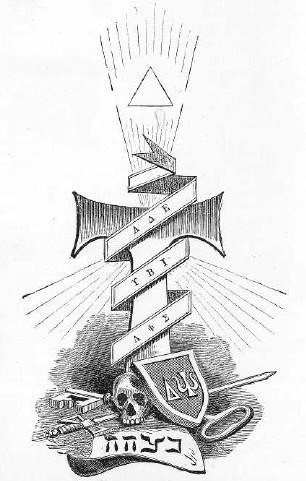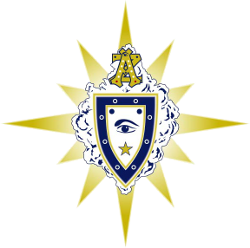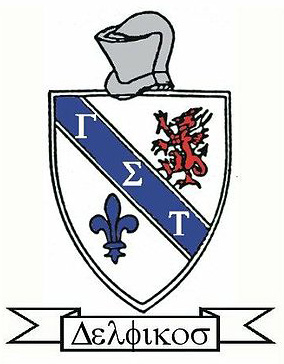
The University of Rochester is a private research university in Rochester, New York, United States. It was founded in 1850 and moved into its current campus, next to the Genesee River in 1955. With approximately 30,000 full-time employees, the university is the largest private employer in Upstate New York and the 7th largest in all of New York State.

Alpha Sigma Phi (ΑΣΦ), commonly known as Alpha Sig, is an intercollegiate men's social fraternity with 181 active chapters and provisional chapters. Founded at Yale in 1845, it is the 10th oldest Greek letter fraternity in the United States.

Sigma Pi (ΣΠ) is a collegiate fraternity with 232 chapters at American universities. As of 2021, it had more than 5,000 undergraduate members and over 118,000 alumni. The fraternity is headquartered in Nashville, Tennessee.

St. Anthony Hall or the Fraternity of Delta Psi is an American fraternity and literary society. Its first chapter was founded at Columbia University on January 17, 1847, the feast day of Saint Anthony the Great. The fraternity is a non–religious, nonsectarian organization. In 1879, William Raimond Baird's American College Fraternities characterized the fraternity as having "the reputation of being the most secret of all the college societies." A 2015 writer for Vanity Fair says the fraternity is "a cross between Skull and Bones and a Princeton eating club, with a large heaping of Society and more than a dash of Animal House." Nearly all chapters of St. Anthony Hall are coed.
Harvard College has several types of social clubs. These are split between gender-inclusive clubs recognized by the college, and unrecognized single-gender clubs which were subject to College sanctions in the past. The Hasty Pudding Club holds claim as the oldest collegiate social club in America, tracing its roots back to 1770. The next oldest institutions, dating to 1791, are the traditionally all-male final clubs. Fraternities were prominent in the late 19th century as well, until their initial expulsions and then eventual resurrection off Harvard's campus in the 1990s. From 1991 onwards, all-female final clubs as well as sororities began to appear. Between 1984 and 2018, no social organizations were recognized by the school due to the clubs' refusal to become gender-inclusive.
There are many collegiate secret societies in North America. They vary greatly in their level of secrecy and the degree of independence from their universities. A collegiate secret society makes a significant effort to keep affairs, membership rolls, signs of recognition, initiation, or other aspects secret from the public.

Alpha Zeta (ΑΖ) is an honorary professional fraternity for students and industry professionals in agricultural and natural resources fields. It was founded in 1897 at Ohio State University and was the first collegiate society for agriculture.

The Delphic Fraternity, Inc., also known as Delphic of Gamma Sigma Tau (ΓΣΤ), is an American multicultural fraternity. It was originally founded in New York State in 1871 as a literary society and was re-established in 1987 as a multicultural fraternity. It was a founding member of the National Multicultural Greek Council.
The North American fraternity and sorority system began with students who wanted to meet secretly, usually for discussions and debates not thought appropriate by the faculty of their schools. Today they are used as social, professional, and honorary groups that promote varied combinations of community service, leadership, and academic achievement.

A fraternity or fraternal organization is an organization, society, club or fraternal order traditionally of men but also women associated together for various religious or secular aims. Fraternity in the Western concept developed in the Christian context, notably with the religious orders in the Catholic Church during the Middle Ages. The concept was eventually further extended with medieval confraternities and guilds. In the early modern era, these were followed by fraternal orders such as Freemasons, the Rosicrucian Society of England, and Odd Fellows, along with gentlemen's clubs, student fraternities, and fraternal service organizations. Members are occasionally referred to as a brother or – usually in a religious context – frater or friar.
College literary societies in American higher education are a particular kind of social organization, distinct from literary societies generally, and they were often the precursors of college fraternities and sororities. In the period from the late 18th century to the Civil War, collegiate literary societies were an important part of campus social life. These societies are often called Latin literary societies because they typically have compound Latinate names.
The Hiram College Library is the library of Hiram College established in 1900. The construction of its predecessor, the Teachout-Cooley Library, funded by Abram Teachout, contained a collection consisting of books donated by the literary societies and the depository collection. The first of several additions made to the building was constructed in 1923.

The Irving Literary Society was a literary society at Cornell University active from 1868 to 1887. The U.S. Bureau of Education described it as a "purely literary society" following the "traditions of the old literary societies of Eastern universities."

Fraternities and sororities at the University of Virginia include the collegiate organizations on the grounds of the University of Virginia in Charlottesville, Virginia. First founded in the 1850s with the establishment of several fraternities, the system has since expanded to include sororities, professional organizations, service fraternities, honor fraternities, and cultural organizations. Fraternities and sororities have been significant to the history of the University of Virginia, including the founding of two national fraternities Kappa Sigma (ΚΣ) and Pi Kappa Alpha (ΠΚΑ).
In North America, fraternities and sororities are social clubs at colleges and universities. They are sometimes collectively referred to as Greek life or Greek-letter organizations, as well as collegiate fraternities or collegiate sororities to differentiate them from traditional not (exclusively) university-based fraternal organizations and fraternal orders that have historically acted as friendly societies or benefit societies to certain groups unlike the ones mentioned in this article.

James Mollison Milne (1850-1903) was the first principal of the State University of New York at Oneonta. The library at SUNY Oneonta is named in his honor.
Gamma Phi Society was a college literary society founded prior to 1833 at the Hamilton Literary & Theological Institution in Hamilton, New York. Gamma Phi Society was the predecessor of the national Delphic Fraternity and the Beta Theta chapter of the Beta Theta Pi at Colgate University.

Delta Phi Kappa (ΔΦΚ), was a fraternity for male returned missionaries of the Church of Jesus Christ of Latter-day Saints at colleges in Utah, Idaho, and Arizona. It existed from 1920 to 1978.
The Adelphian Society was a college literary society established in 1840 at the Hamilton Literary and Theological Institution in Hamilton, New York. It merged into Beta Theta Pi fraternity in 1880.











